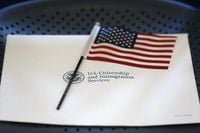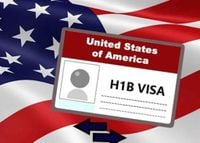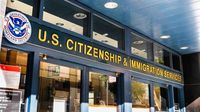In a surprising and unprecedented move, the U.S. Citizenship and Immigration Services (USCIS) has begun issuing Requests for Evidence (RFEs) for H-1B visa applicants and employment-based immigrant petitions, demanding not only residential addresses but also biometric data. This shift in policy has raised significant concerns among immigration attorneys and employers alike, as such requests were not previously part of the standard procedure for these types of petitions.
According to a report by Forbes, the RFEs are being issued under the pretext of collecting what USCIS describes as "potentially adverse information" about certain beneficiaries. However, the agency has not provided any clear explanation regarding the nature of this adverse information, leaving many in the legal community perplexed and worried about the implications of this new requirement.
Vic Goel, an immigration attorney from Goel & Anderson, expressed his alarm, stating, "This is highly unusual because biometrics are not typically required for these case types." He further noted that the RFEs fail to clarify the adverse information referenced, which has left employers and attorneys in a state of uncertainty.
The requests have not only caught immigration attorneys off guard but have also emerged at a time of heightened scrutiny and enforcement actions under the current administration. Reports indicate that over 240 U.S. colleges and universities have documented that more than 1,550 international students and recent graduates are facing changes to their legal status, often due to minor infractions or even social media activity.
The H-1B visa program, which is critical for various industries such as technology, healthcare, and academia, has an annual federal cap of 65,000 new visas, with an additional 20,000 available for individuals holding a U.S. master’s degree or higher. This already competitive environment is further strained by the new RFEs, which could complicate and delay the processing of applications, jeopardizing access to vital talent across sectors.
Goel advised caution in responding to these RFEs, recommending that employers avoid directly providing the requested information. Instead, he suggests citing the regulation 8 CFR 103.2(b)(16)(i), which mandates that USCIS disclose any derogatory information it uses in decision-making. This legal strategy aims to protect clients from responding blindly to vague accusations or unclear procedural shifts.
As the situation unfolds, many stakeholders in the immigration landscape are left questioning whether these unusual RFEs signal a new wave of restrictive measures or if they represent a temporary procedural anomaly. The unpredictability surrounding these requests has placed attorneys and companies in a 'wait and see' mode, as they monitor developments closely.
Legal experts are also raising concerns about the potential use of artificial intelligence and data-driven surveillance methods by the Department of Homeland Security (DHS) to flag applicants based on undisclosed data, possibly from social media or other government databases. Such practices could further complicate the immigration process and raise issues of due process.
In a broader context, the recent RFEs echo past immigration enforcement trends seen during the Trump administration, which was characterized by a significant increase in RFEs and denials for visa applications. While the Biden administration has not publicly endorsed similar tactics, the current situation hints at a continuity of hardline immigration policies.
For employers and H-1B applicants, the stakes are high. Immigration attorneys recommend a cautious and informed response to any RFEs received. They advise against rushing to provide biometrics or personal addresses without thorough legal review and encourage requesting USCIS to disclose the alleged adverse information.
This issue is not just a matter of individual petitions; it is indicative of the U.S.'s ongoing struggle to balance its immigration policies while competing globally for top talent in critical fields like artificial intelligence, healthcare, and biotechnology. As uncertainty in the immigration process risks undermining the country’s competitiveness, employers, universities, and lawmakers are increasingly calling for clearer policies and expanded visa options to attract and retain international professionals.
The unfolding developments surrounding the RFEs and their implications for international students and visa applicants will continue to be closely watched by legal experts and industry stakeholders alike. As the immigration landscape evolves, the need for transparency and fairness in the process remains paramount.








